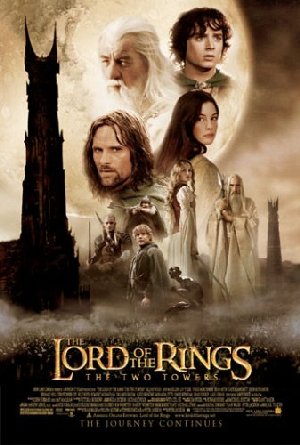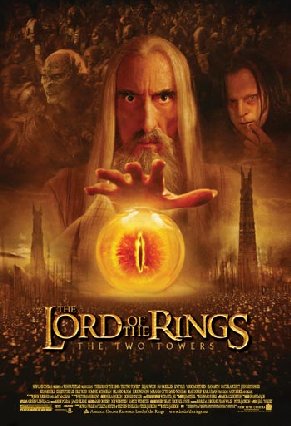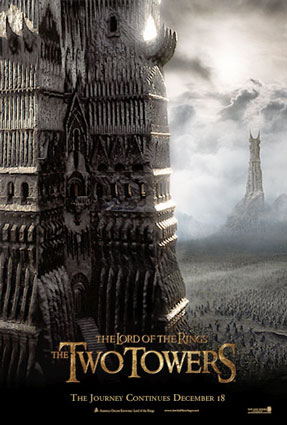The Lord of the Rings
The Two Towers
movie review by G. S. Reis
 With
great ability and a fan's passion, Peter Jackson proceeds in his gigantic assignment
to transpose J.R.R Tolkien's saga to the cinema. Having all three movies been
produced at the same time, it is guaranteed that all qualities of the first
one will remain in the sequels, in a superb and fascinating spectacle which
goes on establishing the trilogy as the great epic of the Fantasy genre.
With
great ability and a fan's passion, Peter Jackson proceeds in his gigantic assignment
to transpose J.R.R Tolkien's saga to the cinema. Having all three movies been
produced at the same time, it is guaranteed that all qualities of the first
one will remain in the sequels, in a superb and fascinating spectacle which
goes on establishing the trilogy as the great epic of the Fantasy genre.
Once again, excellent special effects join extremely beautiful
natural landscapes and man-made sets to form an awesome visual wonder. Howard
Shore's music is no longer a surprise, but it is still very efficient, with
some old themes and a few new ones, from which the most beautiful is the theme
of Rohan. The main cast keeps the competent work, aided by new good additions,
who may not shine but also don't compromise the overall quality of the acting
- even though I would have preferred a younger and more beautiful Éowyn.
The beginning is breath-taking! Not wasting time with unnecessary
introductions, this second part of the trilogy simply does not care about whomever
might not have seen the first, and goes straight to the action, showing in thrilling
details the fight between Gandalf and the Balrog. Being the fellowship apart,
the screenplay becomes less linear and more complex while it follows three distinct
groups. The main plot puts Aragorn, Legolas and Gimli fighting to defend the
Kingdom of Rohan against Saruman's Orcs, culminating in the great battle at
Helm's Deep. Merry and Pippin, escaping from their captors, meet the Ents, ancient
tree-like creatures, while Frodo and Sam encounter the tormented Gollum, who
will guide them in their journey to Mordor.
 It's
curious that the film, sometimes, has even more fantasy than the book, as when
Théoden is released from the spell and his sudden transformation, originally
subtle and gradual. Or as in the conception of creatures, since Tolkien, although
exhaustively descriptive on the geography of Middle-Earth, was always terribly
vague about its inhabitants, never making it clear whether the oliphants were
mere elephants or some related animal, nor giving any idea on wargs being more
than ferocious big wolves. To the audience's delight, Peter Jackson lets his
imagination go loose and shows us amazing creatures.
It's
curious that the film, sometimes, has even more fantasy than the book, as when
Théoden is released from the spell and his sudden transformation, originally
subtle and gradual. Or as in the conception of creatures, since Tolkien, although
exhaustively descriptive on the geography of Middle-Earth, was always terribly
vague about its inhabitants, never making it clear whether the oliphants were
mere elephants or some related animal, nor giving any idea on wargs being more
than ferocious big wolves. To the audience's delight, Peter Jackson lets his
imagination go loose and shows us amazing creatures.
But the greatest novelty is really Gollum, who, made in computer
graphics and played by actor Andy Serkis's voice and motion capture, is being
considered by many as the best digital character ever created. The sequence
where his two personalities quarrel, shown from two different points of view,
deserves to be highlighted - although it immediately and too much reminded me
of Geri's Game, the excellent animated short film from Pixar about a lonely
old man who plays chess with himself.
Flaws? The pace of action is slowed down now and then, or broken
when Treebeard scenes are intercalated to Helm's Deep battle. And I still don't
like the camera shaking in the action scenes, but this time I was expecting
it and made an effort to not allow it to bother me very much. What can we do?
Nothing is perfect. And the qualities are so many and so bigger than the flaws,
that the latter are almost unnoticed.
Radical fans will complain at the changes, as usual. Indeed,
the romantic flashbacks are expendable, being there only to give Arwen something
to do and maybe to please the female audience, but fortunately they are just
a few scenes. The presence of Elves in Helm's Deep prevents the average viewer
to wonder how such noble and good beings could leave the Men abandoned to their
own fate. And both Faramir's change of attitude, taking Frodo to Osgiliath,
and the confrontation with the Nazgûl add tension and adventure to that part
of the journey of the Ring's Bearer, which would be otherwise tranquil and quite
boring.
 Whoever
was frustrated by the ending of the first film (or lack thereof) should not
complain now. If The Fellowship of the Ring did not have an evident climax and
left unwarned spectators waiting for more, The Two Towers has a triple climax
which brings the victory of the forces of Good in two great battles, plus Frodo
and Sam free to proceed to Mordor, with no immediate danger to threaten any
of the heroes. The One Ring and Sauron are not destroyed, of course, but the
ending is more than satisfying to the middle part of a trilogy - much better
than the one for The Empire Strikes Back, for instance.
Whoever
was frustrated by the ending of the first film (or lack thereof) should not
complain now. If The Fellowship of the Ring did not have an evident climax and
left unwarned spectators waiting for more, The Two Towers has a triple climax
which brings the victory of the forces of Good in two great battles, plus Frodo
and Sam free to proceed to Mordor, with no immediate danger to threaten any
of the heroes. The One Ring and Sauron are not destroyed, of course, but the
ending is more than satisfying to the middle part of a trilogy - much better
than the one for The Empire Strikes Back, for instance.
Peter Jackson was very wise to leave Shelob to the third film,
avoiding both an interruption in the action and recurring complaints about the
movie having no end. The long-awaited Gandalf and Saruman's confrontation was
also postponed. It would have taken a little of the strength of the war climaxes,
for certain, yet it would have served to unite two parallel plots and to make
a perfect end to the fall of Isengard - presuming, of course, a magical battle
far more exciting than the verbal duel described in the book. Good for The Return
of the King, which will start on the highest thrill!
Retorna à página principal
gsreis@pobox.com
 With
great ability and a fan's passion, Peter Jackson proceeds in his gigantic assignment
to transpose J.R.R Tolkien's saga to the cinema. Having all three movies been
produced at the same time, it is guaranteed that all qualities of the first
one will remain in the sequels, in a superb and fascinating spectacle which
goes on establishing the trilogy as the great epic of the Fantasy genre.
With
great ability and a fan's passion, Peter Jackson proceeds in his gigantic assignment
to transpose J.R.R Tolkien's saga to the cinema. Having all three movies been
produced at the same time, it is guaranteed that all qualities of the first
one will remain in the sequels, in a superb and fascinating spectacle which
goes on establishing the trilogy as the great epic of the Fantasy genre. It's
curious that the film, sometimes, has even more fantasy than the book, as when
Théoden is released from the spell and his sudden transformation, originally
subtle and gradual. Or as in the conception of creatures, since Tolkien, although
exhaustively descriptive on the geography of Middle-Earth, was always terribly
vague about its inhabitants, never making it clear whether the oliphants were
mere elephants or some related animal, nor giving any idea on wargs being more
than ferocious big wolves. To the audience's delight, Peter Jackson lets his
imagination go loose and shows us amazing creatures.
It's
curious that the film, sometimes, has even more fantasy than the book, as when
Théoden is released from the spell and his sudden transformation, originally
subtle and gradual. Or as in the conception of creatures, since Tolkien, although
exhaustively descriptive on the geography of Middle-Earth, was always terribly
vague about its inhabitants, never making it clear whether the oliphants were
mere elephants or some related animal, nor giving any idea on wargs being more
than ferocious big wolves. To the audience's delight, Peter Jackson lets his
imagination go loose and shows us amazing creatures. Whoever
was frustrated by the ending of the first film (or lack thereof) should not
complain now. If The Fellowship of the Ring did not have an evident climax and
left unwarned spectators waiting for more, The Two Towers has a triple climax
which brings the victory of the forces of Good in two great battles, plus Frodo
and Sam free to proceed to Mordor, with no immediate danger to threaten any
of the heroes. The One Ring and Sauron are not destroyed, of course, but the
ending is more than satisfying to the middle part of a trilogy - much better
than the one for The Empire Strikes Back, for instance.
Whoever
was frustrated by the ending of the first film (or lack thereof) should not
complain now. If The Fellowship of the Ring did not have an evident climax and
left unwarned spectators waiting for more, The Two Towers has a triple climax
which brings the victory of the forces of Good in two great battles, plus Frodo
and Sam free to proceed to Mordor, with no immediate danger to threaten any
of the heroes. The One Ring and Sauron are not destroyed, of course, but the
ending is more than satisfying to the middle part of a trilogy - much better
than the one for The Empire Strikes Back, for instance.